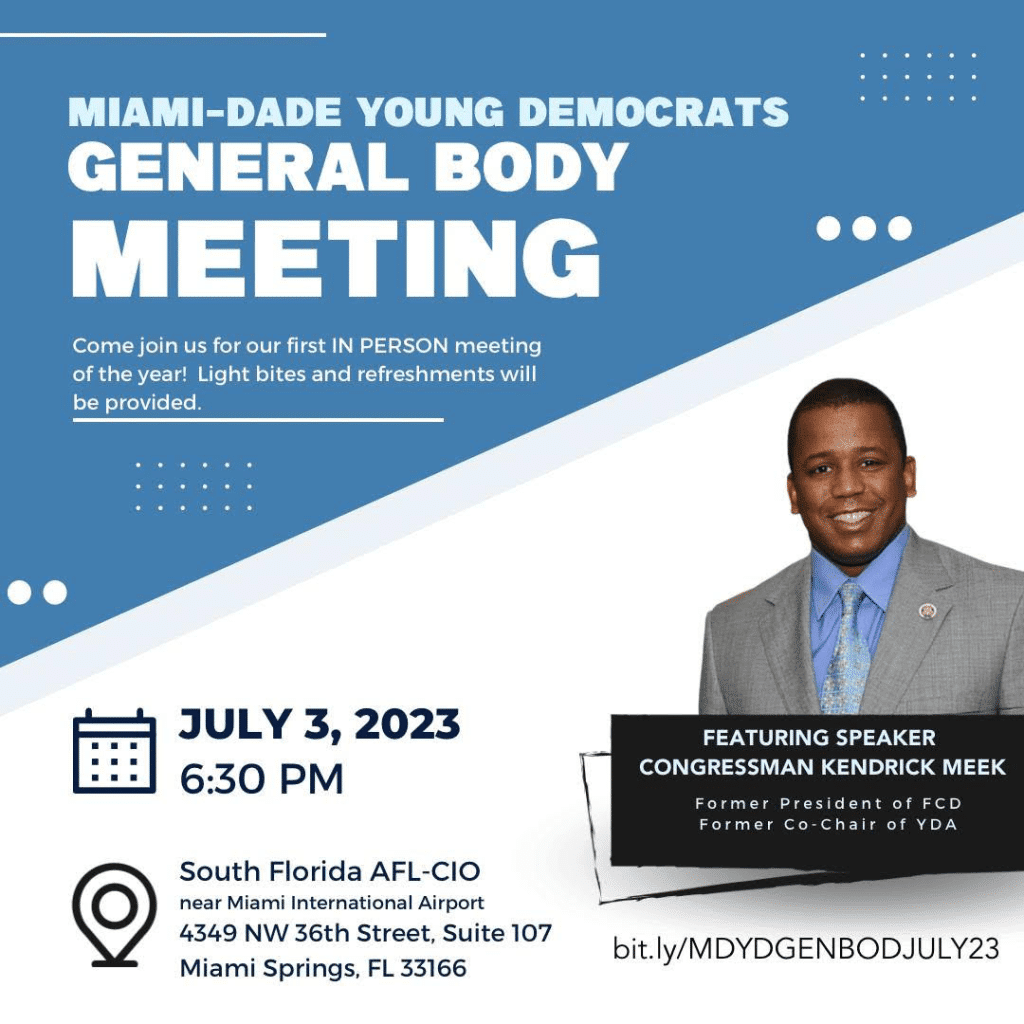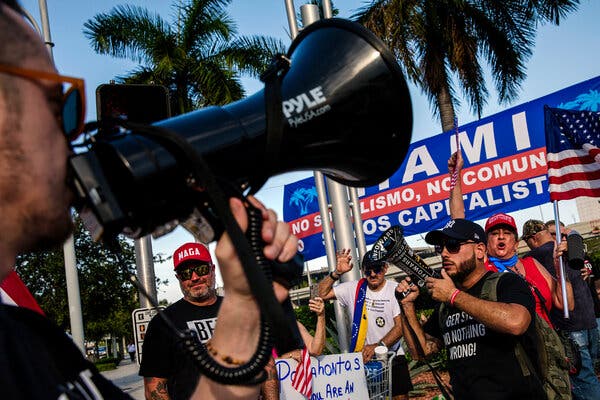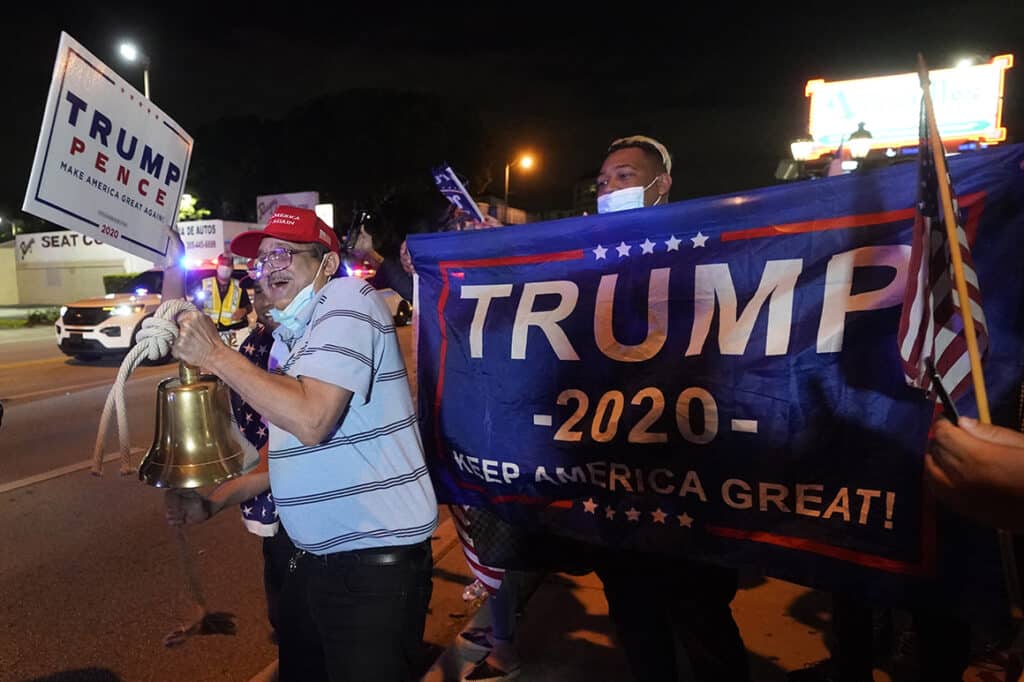Miami, Florida is buzzing with political events that are sure to captivate your attention. From dynamic rallies to heated debates, the city is abuzz with the energy of political discourse. Known for its vibrant culture and diverse community, Miami provides a unique backdrop for politicians to connect with their constituents. Whether you’re a politics enthusiast, a concerned citizen, or just curious about the current state of affairs, these political events in Miami offer a window into the heart of American democracy. So, get ready to immerse yourself in the thrilling world of political happenings as we take you on a journey through Miami’s political landscape.

1. Historical Political Events in Miami
Miami, Florida has a rich history of political events that have shaped the direction of the city. From its early days as a small settlement to its current status as a bustling metropolis, Miami has been a hotbed for political activity. Understanding the city’s political history is essential in order to fully grasp the current political landscape.
1.1 Early Political History of Miami
The political history of Miami can be traced back to its founding in 1896. During this time, the city was primarily inhabited by settlers from the Bahamas and African Americans seeking refuge from racial discrimination in the South. Early political events in Miami focused on issues such as civil rights, economic development, and infrastructure improvements.
One notable event in Miami’s early political history was the establishment of the first African-American newspaper, “The Miami Times,” in 1923. This newspaper played a crucial role in advocating for civil rights and challenging racial segregation in the city. It provided a platform for African American voices to be heard and was instrumental in shaping the social and political landscape of Miami.
1.2 Key Political Figures in Miami History
Several key political figures have played significant roles in shaping the political landscape of Miami. One such figure is Janet Reno, who served as Miami-Dade County State Attorney from 1978 to 1993 before becoming the first female U.S. Attorney General. Reno’s commitment to justice and fairness made her a beloved figure in Miami and her impact is still felt today.
Another influential political figure in Miami’s history is Xavier L. Suarez, who became Miami’s first Cuban-born Mayor in 1985. Suarez’s election marked a turning point in Miami’s political landscape, as it represented a shift towards greater representation and inclusion of the city’s diverse population. His leadership paved the way for future Cuban-American politicians to be elected to prominent positions.
2. Current Political Landscape in Miami
Understanding the current political landscape in Miami is essential for anyone interested in the city’s politics. Miami is known for its diverse population, which has led to a vibrant and dynamic political environment.
2.1 Political Parties and Ideologies in Miami
Miami’s political landscape is heavily influenced by the presence of two dominant political parties: the Democratic Party and the Republican Party. While the Democratic Party has traditionally maintained a stronghold in Miami-Dade County, there is also a significant contingent of Republicans, particularly among the Cuban-American population.
In addition to the two major parties, there is also a presence of smaller political parties and independent candidates in Miami. These parties and candidates offer alternative perspectives and ideologies, providing voters with a wider range of choices during elections.
2.2 Major Political Issues in Miami
Several major political issues dominate the current discourse in Miami. One of the most pressing issues is affordable housing. As Miami continues to experience rapid growth and development, the cost of housing has skyrocketed, making it increasingly difficult for many residents to afford a home. This issue has become a key focus for politicians, who are working to implement policies that promote affordable housing solutions.
Another significant political issue in Miami is climate change and its impact on the city. Miami is particularly vulnerable to rising sea levels and extreme weather events, making it crucial for local politicians to prioritize climate change mitigation and adaptation efforts. Many political leaders in Miami have made sustainability and environmental conservation central to their campaigns and agendas.

3. Elections and Campaigns in Miami
Elections and campaigns are integral to the political process in Miami. Whether at the local, state, or national level, elections play a crucial role in determining the direction of the city.
3.1 Local Elections in Miami
Local elections in Miami are fiercely contested and often draw significant attention from the community. These elections determine positions such as Mayor, City Council members, and County Commissioners. Candidates in local elections often focus on issues directly affecting the city, such as public transportation, education, and economic development.
One notable feature of local elections in Miami is the diverse pool of candidates. Given the city’s diverse population, candidates from various backgrounds and ethnicities compete for elected positions, leading to a vibrant and inclusive political landscape.
3.2 State and National Elections Impacting Miami
In addition to local elections, state and national elections also have a significant impact on the political landscape of Miami. As a major metropolitan area, Miami plays a crucial role in statewide and national elections. Candidates often visit the city to rally support and engage with the diverse electorate.
State and national elections impact Miami in several ways. Policies enacted at the state and national levels can directly affect the city and its residents. Additionally, Miami’s political preferences have the potential to influence broader political trends, particularly in Florida, which is considered a key swing state in national elections.
4. Political Organizations and Activism in Miami
Political organizations and activism play a crucial role in shaping the discourse and direction of politics in Miami. From grassroots movements to established interest groups, these organizations work to advance their respective agendas and advocate for their members’ interests.
4.1 Political Organizations and Interest Groups in Miami
Miami is home to a diverse array of political organizations and interest groups, representing various industries, causes, and ideologies. These organizations work to promote and protect the interests of their members, and often play an active role in elections and policy-making processes.
One prominent political organization in Miami is the Miami-Dade Democratic Party, which works to elect Democratic candidates and promote progressive policies. The Republican Party of Miami-Dade County is also a significant political organization, representing Republicans and conservative ideals.
4.2 Political Activism and Protests in Miami
Political activism and protests are integral to Miami’s political landscape. From demonstrations advocating for racial justice to marches demanding action on climate change, Miami has seen its fair share of political activism. These events provide a platform for residents to voice their concerns and push for change.
Miami has been particularly active in recent years regarding issues such as gun control and immigration. Activist groups have organized rallies and protests to call for stricter gun laws and more humane immigration policies. The city’s diverse population adds to the richness of these movements, as individuals from various backgrounds come together to advocate for their causes.

5. Role of Media in Miami’s Political Events
The media plays a crucial role in shaping and documenting Miami’s political events. Local media outlets provide coverage of political news and events, helping to inform the public and hold elected officials accountable.
5.1 Local Media Coverage of Political Events
Local media outlets in Miami, such as newspapers, television stations, and online news platforms, provide comprehensive coverage of political events. They report on elections, legislative actions, and local political developments, giving residents a thorough understanding of the city’s political landscape.
Local media coverage often focuses on issues that directly affect the community, such as education, healthcare, and infrastructure. This coverage helps residents stay informed and engaged in the political process, empowering them to make informed decisions when it comes to elections and civic participation.
5.2 Social Media’s Influence on Miami Politics
In recent years, social media has emerged as a powerful force in shaping Miami’s political events. Platforms such as Twitter, Facebook, and Instagram provide individuals and organizations with the ability to share information, promote their causes, and mobilize communities.
Politicians in Miami have recognized the power of social media and often utilize these platforms to engage with constituents and spread their message. Social media allows politicians to reach a wider audience and generate support by sharing their policies and engaging in direct communication with the public.
6. Impact of Miami’s Political Events on the Community
Political events in Miami have a significant impact on the community, both economically and socially. The decisions made by elected officials and the outcomes of political processes can shape the city’s future and affect the lives of its residents.
6.1 Economic Impact of Political Decisions in Miami
Political decisions in Miami can have a direct impact on the city’s economy. For example, decisions regarding tax policies, business regulations, and economic incentives can influence the growth of industries and attract or deter investment. The economic impact of political decisions has far-reaching consequences for job creation, business development, and overall prosperity in Miami.
Additionally, political events such as proposed infrastructure projects or changes in zoning regulations can impact property values and real estate markets. In a city like Miami, where the real estate industry is a significant driver of the economy, these political decisions play a crucial role in shaping the city’s economic landscape.
6.2 Social Issues and Political Events in Miami
Political events in Miami can also have a profound impact on social issues within the community. For example, decisions on social policies such as education funding, healthcare access, and criminal justice reform can directly affect the lives of residents.
Political events and debates surrounding social issues often lead to increased awareness and community engagement. They provide opportunities for dialogue and advocacy, allowing residents to have a voice in shaping policies that impact their lives. By participating in political events and supporting causes they care about, residents can contribute to positive social change in Miami.

7. Political Scandals and Controversies in Miami
Like any other city, Miami has had its fair share of political scandals and controversies throughout its history. These events have the potential to undermine public trust in government and impact the perception of Miami’s political landscape.
7.1 Notable Political Scandals in Miami’s History
Several notable political scandals have occurred in Miami’s history. One such scandal involved former Miami Mayor Joe Carollo, who was indicted in 1998 on federal corruption charges. Carollo’s trial and subsequent conviction were highly publicized and highlighted issues of corruption in the city’s government.
Another notable political scandal in Miami involved former City Commissioner Michelle Spence-Jones, who was indicted on charges of grand theft and bribery in 2010. The scandal overshadowed her tenure and led to her temporary removal from office.
7.2 Effect of Scandals on Public Trust in Miami Politics
The impact of political scandals on public trust in Miami politics cannot be underestimated. When politicians are involved in scandalous behavior, whether it be corruption or ethical violations, it erodes the public’s confidence in their elected officials.
Scandals can create a sense of disillusionment among residents and lead to decreased voter turnout in elections. They also contribute to a negative perception of Miami’s political landscape, which can hinder progress and impede the ability of elected officials to effectively govern.
8. Political Leadership in Miami
Political leadership plays a crucial role in shaping Miami’s future. The actions and decisions of elected officials have a direct impact on the community, and strong leadership is crucial for addressing the city’s challenges and realizing its potential.
8.1 Current Elected Officials in Miami
As of [current year], Miami is led by [insert names of current elected officials]. These individuals hold positions such as Mayor, City Commissioner, County Commissioner, and State Representative. Their leadership and decision-making have a direct impact on the lives of Miami residents.
It is important for residents to stay informed about the actions and policies of their elected officials, as this knowledge empowers individuals to engage in meaningful dialogue and hold their representatives accountable.
8.2 Influence of Political Leadership on Miami’s Direction
The influence of political leadership on Miami’s direction cannot be understated. Elected officials have the power to shape policies, implement infrastructure projects, and allocate resources that directly impact the community.
Strong political leadership is necessary for addressing pressing issues and ensuring that the city continues to evolve and prosper. Leaders who prioritize transparency, inclusivity, and collaboration are more likely to foster a positive political environment and create meaningful change for the residents of Miami.

9. International Impact on Miami’s Political Events
Miami’s political events are not solely confined to the city itself. The international context and global events also have an impact on Miami’s political landscape.
9.1 Immigration and Miami’s Political Landscape
Miami has a large immigrant population, particularly from Latin America and the Caribbean. Changes in immigration policies at the national level have a direct impact on Miami and its residents. Immigration policies influence the composition of the population, shape cultural dynamics, and impact the labor market.
Immigration policies and debates surrounding issues such as DACA (Deferred Action for Childhood Arrivals) have been a significant part of Miami’s political landscape. The diverse immigrant population in Miami often mobilizes to advocate for comprehensive immigration reform and to protect the rights of undocumented residents.
9.2 Global Events and Miami’s Political Response
Global events can also impact Miami’s political landscape. For example, economic crises in Latin American countries have led to an influx of immigrants seeking refuge in Miami. This sudden increase in population has put pressure on local resources and influenced the city’s political discourse on immigration and social services.
International conflicts and alliances can also shape Miami’s political response. Issues such as trade relationships, diplomatic relations, and security concerns have the potential to influence the city’s policies and priorities. Miami’s political leaders must take into account these global events and coordinate with state and national policymakers to address their implications.
10. Future Outlook of Political Events in Miami
Looking towards the future, several emerging political trends and predictions can be observed in Miami. These trends have the potential to shape the future political events in the city.
10.1 Emerging Political Trends in Miami
One emerging political trend in Miami is the increasing focus on sustainability and climate change. Given the city’s vulnerability to rising sea levels and extreme weather events, political leaders and activists are prioritizing environmental issues in their platforms. Efforts to mitigate the effects of climate change and promote sustainable practices are expected to be key factors in future political discourse.
Another emerging political trend is the growing influence of young voters. As the demographic makeup of Miami continues to evolve, young voters are becoming a significant force in political events. Their priorities and perspectives on issues such as education, healthcare, and affordable housing will shape the political landscape for years to come.
10.2 Predictions for Future Political Events in Miami
Predicting specific future political events in Miami is challenging, as the political landscape is constantly evolving. However, several predictions can be made based on current trends and ongoing issues.
One prediction is that affordable housing will remain a key political issue in Miami. As the city continues to grow and attract new residents, the need for accessible and affordable housing will persist. Elected officials will likely need to continue addressing this issue and develop innovative solutions to ensure that all residents have access to quality housing.
Another prediction is that Miami’s political events and activism will become increasingly connected to broader national and global movements. Issues such as racial justice, climate change, and income inequality resonate with Miami residents just as they do with people across the country and the world. Miami will continue to be part of larger political conversations and contribute to movements advocating for positive change.
In conclusion, understanding the historical, current, and future political events in Miami is crucial for anyone seeking a comprehensive understanding of the city’s political landscape. From early political history to present-day issues and predictions for the future, Miami’s political events shape the city’s direction and impact the lives of its residents. By staying informed and actively participating in the political process, individuals can contribute to a vibrant and inclusive political environment in Miami.